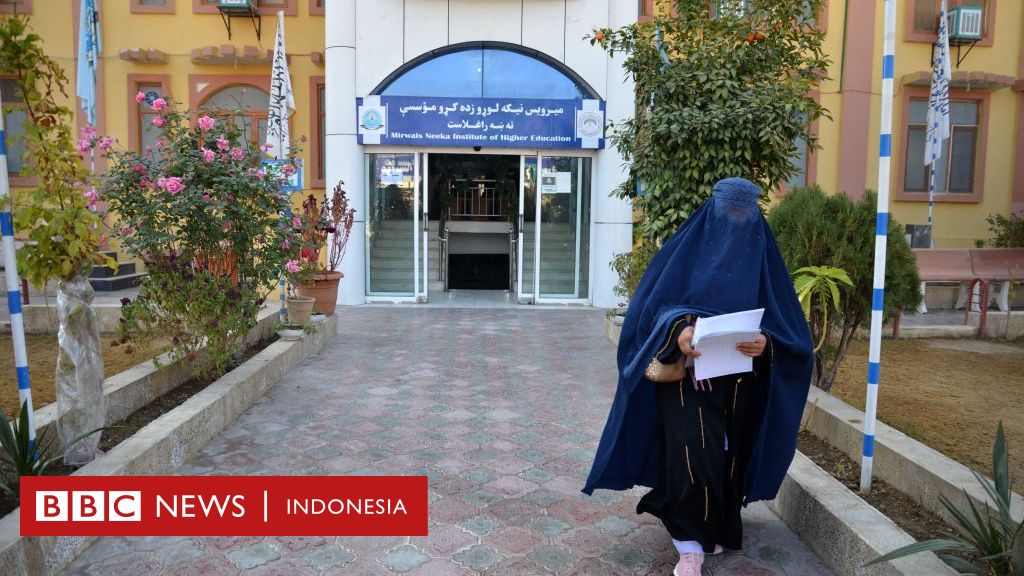image sources, AFP
A student walks in front of a university in Kandahar province on December 21, 2022.
Banning education is a policy that women across Afghanistan have feared since the return of the Taliban.
On Wednesday (21/12), many veiled women who were about to enter their campus were blocked and refused by the Taliban guards.
Footage shows the female students crying as they are chased off campus.
After banning girls from most high schools for the past 16 months, the Taliban this week also banned university education for girls.
Setara Farahmand, a German literature student at Kabul University, said the Taliban’s main concern was the oppression of women. “The Taliban’s goal right now is to suppress women’s rights. They don’t want women to play a role in the development of the country and to work together, with our brothers.
“They just want the women home, that’s all. They don’t want our donations,” he said.
Read also :
Taliban authorities had issued the order on Tuesday – and the next day other educational institutions, including Islamic religious schools and private colleges in several provinces, also implemented the decree.
Sources from three provinces – Takhar in the north, Ghazni in the south-east and the capital Kabul – confirmed to the BBC that the Taliban had prevented girls from attending private schools.
It seems that all channels of formal education for girls have been closed.
image sources, AFP
Female students were confronted by Taliban security agents in Kabul as they were about to enter campus.
The school ban prompted some women to march boldly on the streets of Kabul on Wednesday – a dangerous move given the Taliban’s record of arresting protesters.
The small demonstration was quickly dispersed by Taliban officers.
This generation sees them as the lucky bunch – getting the education their mothers, older sisters and cousins failed to get.
Instead, they see the future as doomed.
The Taliban, which began as a hardline Islamic militant group, had vowed to uphold women’s rights when they returned to power in August last year – after the horrors of their previous rule from 1996 to 2001, when women could neither work nor study.
But their latest move once again strips away the freedoms and rights granted to women after the withdrawal of US-led forces from Afghanistan and the return of the Taliban to power.
image sources, AFP
Kabul University students take entrance exams in October.
But just three months ago, the Taliban allowed university entrance exams to be held.
Thousands of women have taken the examination at the provincial level across the country.
Many studied in secret – either at home or by taking the risk of going to hidden tutoring programs for girls.
The danger is always present. During several exams, bombers targeted the school, killing students.
But the young women persisted.
Even when the Taliban imposed last-minute restrictions on subjects such as economics, engineering and journalism in November, they kept trying, with many applying to teach and in medicine.
As another BBC student put it: “Why do we always have to be victims? Afghanistan is a poor country. But women in this country have experienced poverty on top of all the other problems and they have to still suffer.”
Girls’ schools have long been a point of contention between conservative and more moderate factions of the Taliban.
The current ban on universities demonstrates a victory for more fundamentalist groups within the Taliban, whose Supreme Leader Hibatullah Akhundzada believes modern education – especially for women and girls – is flawed in Islamic teachings.
But not everyone in the ruling movement thinks like her – and there are reports from more moderate officials in cities like Kabul who want girls over the age of 12 to get an education.
As human rights defenders have warned, this decision has an impact on the future of the whole country.
“No country can prosper when half the population is suffocated,” warned US Secretary of State Anthony Blinken.
Western countries insist on girls’ education as a condition the Taliban must meet if they want global recognition.
But so far the Taliban have ignored the criticism.
image sources, Getty Images
Numerous demonstrations have taken place in Afghanistan to demand access to education since the return of the Taliban.
For Afghan families, both at home and around the world, seeing their daughters’ future return to the “dark ages” has fueled fear and anger.
News of the college ban prompted several Afghan women activists to post stories about their own college graduation day – complete with hats and gowns.
The denial of the Taliban since they regained power has not been enough, they say.
And it’s part of a growing wave of restrictions on women’s daily lives in recent weeks.
In November, women in Kabul were also barred from public places such as parks and gymnasiums.
Women are increasingly confined to their homes in policies that amount to imprisonment, according to the United Nations.
“Un-Islamic Acts”
For a law student, his university career now seems to be over. His university term ended for the winter holidays and will not start again until March.
But now he’s not allowed back on campus – he’s “lost everything”.
A specialist in Sharia law, he told the BBC he struggled to understand it in accordance with Islamic teachings.
“The Taliban have taken away the rights that Islam and Allah have given us,” he told the BBC.
“They should go to other Islamic countries and see that their actions are not Islamic. From what they say, it’s Sharia. But why do they want to practice it only on women? Why don’t they not apply to men?
Other scholars support his opinion. Nawida Khurasani, one of Afghanistan’s few female scholars, said the move goes against Islamic values.
“There is no place in Islam – because Islam commands men and women to be educated,” said Nawida, who now lives in Canada.
image sources, PROVIDED
Nawida participated in demonstrations demanding that girls go to school. He wrote “Education is our right” on a poster.
A religious scholar who spoke to the BBC – an imam living in Afghanistan – agreed that both men and women should receive an education based on Islam.
But for many observers of Afghanistan, it is useless to try to explain the actions of the Taliban according to Islamic precepts.
They say the college ban is simply the goal of completely suppressing women and erasing the freedoms they had in the years between periods of Taliban rule.
Closing the door to university education is an attempt by the Taliban to perfect their control over women.
“Afghanistan is not a country for women but a prison for women,” said Afghan scholar and activist Humaira Qaderi, who lives in the United States.
“There is no more social life for Afghan women. The street is now dominated by men.
“It was the last thing the Taliban could do. But they did it.”

“Amateur problem solver. Hipster-friendly alcohol lover. Beer buff. Infuriatingly humble tv geek.”






